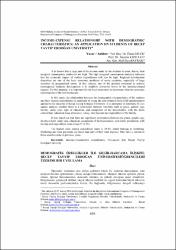| dc.contributor.author | Dilek, Önder | |
| dc.contributor.author | Kızıltan, Alaattin | |
| dc.contributor.author | Bayrak, Akif Ziya | |
| dc.date.accessioned | 2017-07-10T07:02:55Z | |
| dc.date.available | 2017-07-10T07:02:55Z | |
| dc.date.issued | 2016-12 | |
| dc.identifier.uri | https://hdl.handle.net/20.500.11776/1843 | |
| dc.description | International Congress of Management Economy And Policy, 26-27 Kasım 2016, İstanbul | en_US |
| dc.description.abstract | Öğrenciler tarafından elde edilen gelirlerin büyük bir kısmının harcandığını, yani marjinal tüketim eğilimlerinin yüksek olduğu bilinmektedir. Marjinal tüketim eğilimin yüksek olması, öğrenci harcamalarının ekonomik etkisinin de yüksek olacağına işaret etmektedir. Bölgelerarası gelişmişlik farkları, birçok ülkenin özellikle de coğrafi bakımdan büyük ülkelerin temel ekonomik problemlerinden biridir. Bu bağlamda, bölgelerarası dengeli kalkınmayı sağlamak için üretilen politikalardan biri de geri kalmış bölgelerde üniversite kentleri kurmaktır. Bu amaçla üniversitelerin ekonomik katkıların ne olduğunun belirlenmesi yerel ekonomiler için önem arz etmektedir. Bu araştırmada, Recep Tayyip Erdoğan Üniversitesi öğrencilerine yönelik uygulanan 1100 adet anketten elde edilen veriler kullanılarak, öğrencilerin demografik özellikleri ile gelir-harcamaları arasındaki ilişkinin varlığı incelenmektedir. Öğrencilerin barındıkları yer, cinsiyet, yaş, okudukları fakülte, sınıf, öğrenim şekli, aile reisinin mesleği, ailedeki fert sayısı gibi değişkenlerin burs, öğrenim kredisi, harçlık, maaş, ailenin toplam geliri ve harcama kalemleri arasında bir ilişki olup olmadığı ki-kare analizi ile tespit edilmeye çalışılmıştır. Öğrencilerin barındıkları yer, cinsiyet, yaş, okudukları fakülte/yüksekokul,sınıf, öğrenim, aile reisinin mesleği ve ailedeki fert sayısı ile gelir ve harcama kalemleri arasında anlamlı ilişkiler olduğu sonucuna ulaşılmıştır (P < 0,05 olduğundan dolayı). Harcama kalemleri arasındaki en yüksek oran %29,4 ile barınmaya aittir. Barınma ve gıda harcamaları toplam harcamalarının yarısından fazladır. Bu oran daha önceki yıllarda yapılmış olan çalışmalarla benzerlikler göstermektedir. | en_US |
| dc.description.abstract | It is known that a large part of the income made by the students is spent, that is, their marginal consumption tendencies are high. The high marginal consumption tendency indicates that the economic impact of student expenditures will also be high. Regional development disparities are one of the basic economic problems of many countries, especially of large countries in geographical terms. In this context, one of the policies produced to achieve interregional balanced development is to establish university towns in the underdeveloped regions. For this purpose, it is important for the local economies to determine what the economic contributions of the universities are. In this study, the relationship between the demographic characteristics of the students and their income-expenditures is examined by using the data obtained from 1100 questionnaires applied to the students of Recep Tayyip Erdoğan University. It is attemptem to determine by chi - square analysis whether there is a correlation between variables such as place, gender, age, faculty, study year, type of education, and occupation of the householder, with the items scholarship, education loan, allowance, salary, total income and expenditure of the family. It was found out that there are significant correlations between the place, gender, age, faculty/school, study year, education, occupation of the householder, and family population, with income and expenditure items (since P <0.05). The highest ratio among expenditure items is 29.4% which belongs to sheltering. Sheltering and food payments are more than half of their total expense. This ratio is similar to there searches done in previous years. | en_US |
| dc.language.iso | tur | en_US |
| dc.publisher | Namık Kemal Üniversitesi,İktisadi ve İdari Bilimler Fakültesi | en_US |
| dc.rights | info:eu-repo/semantics/openAccess | en_US |
| dc.subject | Gelir-Tüketim Harcamaları | en_US |
| dc.subject | Ki-kare Analizi | en_US |
| dc.subject | Recep Tayyip Erdoğan Üniversitesi | en_US |
| dc.subject | Income-Consumption expenditures | en_US |
| dc.subject | Chi-square test | en_US |
| dc.subject | Recep Tayyip Erdoğan Üniversity | en_US |
| dc.title | DEMOGRAFİK ÖZELLİKLER İLE GELİR-HARCAMA İLİŞKİSİ: RECEP TAYYİP ERDOĞAN ÜNİVERSİTESİÖĞRENCİLERİ ÜZERİNE BİR UYGULAMA | en_US |
| dc.title.alternative | INCOME-EXPENSE RELATIONSHIP WITH DEMOGRAPHIC CHARACTERISTICS: AN APPLICATION ON STUDENTS OF RECEP TAYYIP ERDOGAN UNIVERSITY | en_US |
| dc.type | article | en_US |
| dc.relation.ispartof | Balkan Sosyal Bilimler Dergisi | en_US |
| dc.department | Tekirdağ Namık Kemal Üniversitesi Dergileri | en_US |
| dc.authorid | 26598 | en_US |
| dc.authorid | 6479 | en_US |
| dc.authorid | 205045 | en_US |
| dc.identifier.startpage | 656 | en_US |
| dc.identifier.endpage | 668 | en_US |
| dc.relation.publicationcategory | Makale - Ulusal Hakemli Dergi - Kurum Öğretim Elemanı | en_US |



















